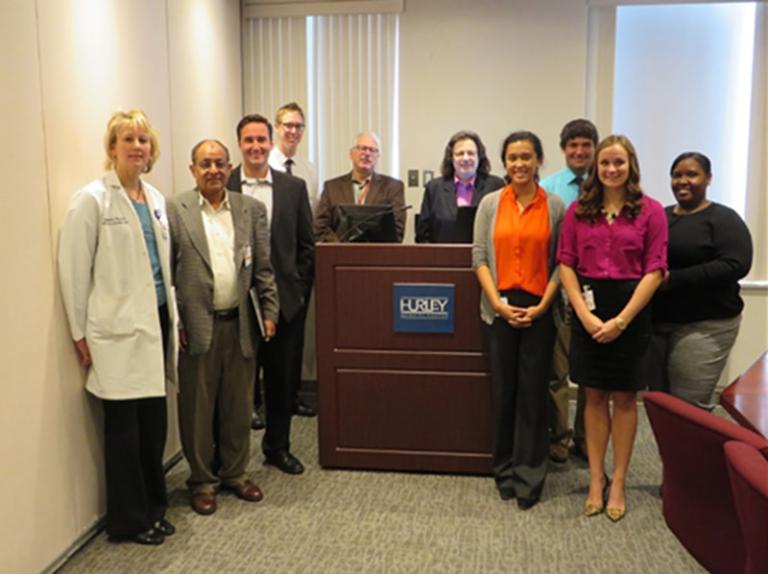
“We looked at the time card data and using that we identified the peak days when they had the most amount of people at the facility. Even at the highest peak, it didn’t exceed the number of spots available.”
Christopher LaFayette came to Kettering University in search of a practical education in both the classroom and in his co-op experience. So when Hurley Medical Center approached Kettering University to conduct a parking study, LaFayette and his classmates were elated to take on the challenge.
“They’ve had employee complaints about parking,” LaFayette said. “They wanted us to do an analysis to see if they actually had a problem or not and what we would recommend to fix the potential problem.”
LaFayette and his classmates – David Butler, Alex Stair, Mallika Wadhawan, Cassidy Metzer and Kenya McDonald – evaluated the available parking spots at Hurley, the traffic to and from Hurley during low and peak times and number of spots available during both and made recommendations based on their findings.
“We concluded that they do not have a shortage of parking,” LaFayette said. “We looked at the time card data and using that we identified the peak days when they had the most amount of people at the facility. Even at the highest peak, it didn’t exceed the number of spots available.”
The group’s research was a part of their capstone project with Dr. Pete Gheresus and although they determined that the number parking spots was not an issue, the quality of wayfinding to those spots needs to be addressed.
The research team recommended the following: bettering placement of parking signs; strategic placing of parking signs; using consistent size, wording and font for all parking signs and improving the striping of parking spots to clearly mark spots.
“It was good working with the group,” LaFayette said. “I’ve known all my team members for years. It’s a good experience. It’s nice to be able to go and do something practical while giving back to our community partner at Hurley.”
Choosing a Practical Education
LaFayette’s grandfather Bill (’55), father Martin (’84) and mother Connie (’86) all graduated from Kettering University but Christopher chose to go in a different direction. LaFayette was in search of a traditional collegiate experience which led him to the University of Dayton. After only three semesters, he decided to transfer north to Flint to pursue a degree in Industrial Engineering.
Family Legacy Stories:
- Kettering: A family affair
- Kettering has been a perfect fit for the Oskoian family
- Kettering is part of Cole family legacy
“I’m one of those people who has to be active constantly so Kettering is a place where you are occupied and working and pretty much doing something all the time,” LaFayette said. “I’m extremely involved on campus. I like the co-op experience. “
LaFayette serves on the finance council in student government, is the president and founder of the Plastics Engineering Club and is the co-founder of the management consulting club on campus. LaFayette began his co-op experience at the UPS office in Chicago and has since transferred to the regional location in Livonia, Michigan.
It’s common for Kettering students to transfer their knowledge gained from co-op to the classroom but in LaFayette’s case, it’s also happening in the opposite direction.
“Coincidently, this co-op term, I’m running a parking analysis for the entire UPS Great Lakes District to see how many people are at each of the facilities,” LaFayette said.
LaFayette is applying the same methodology that he used in the Hurley capstone project to examine the parking situation in 64 UPS facilities spread across Michigan and Ohio. He’s evaluating parking time cards to determine peak times and compare the availability of spots at each of the locations.
“I think the parking study is a good example of the breadth that industrial engineering can span, “LaFayette said. “I like to call it professional problem-solving, we can take any problem and solve it and find a better solution.”